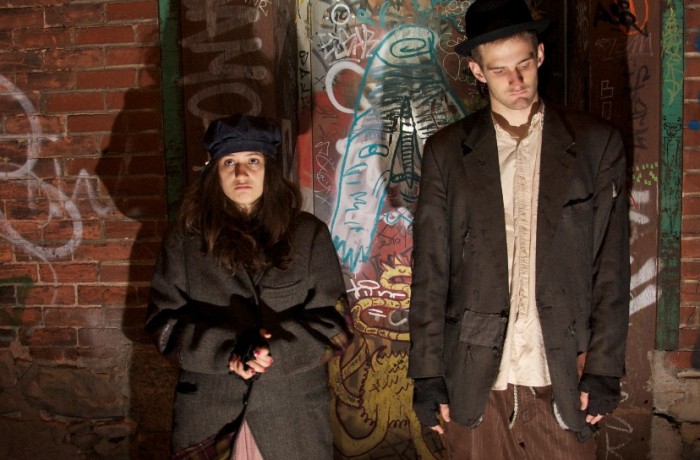Samuel Beckett’s oft-cited yet largely misunderstood piece of absurdist theatre, Waiting for Godot, has had its own share of lingering—not idly, but in a constant state of rework, reinterpretation, and reproduction. In the 60 years since its publication, the show’s vagabond characters Vladimir and Estragon have plodded from stage to stage, until finally setting up their meagre camp in McGill’s own Players’ Theatre this season. Thoroughly re-envisioned for a modern audience, director Isaac Robinson’s take on Beckett’s slim but weighty work is one part respectful preservation, one part winking reinterpretation.
From Beckett’s vague set description, the Players construct a familiar Montreal site: the back alley of a seedy bar, the door marked “Delivery Room: Godot’s Bar.” Amid flyers plastered across the set’s wall hides the central set prop: the indispensable willow tree. Estragon (Martin Law), in his patchwork jacket and ill-fitting boots slumped beneath the “tree,” could just as easily be the unlucky gentleman of the show’s original time as of today. Law, lank-limbed, unshaven, and slumped with all the pride of a man recently awoken after a night spent in a ditch, portrayed Estragon (“Gogo” affectionately) with deadpan excellence. From tattered bowler to exposed toe, Law embodied the hardened Estragon with an appropriate lack of panache.
As his companion, compatriot, and sometimes combatant, Vladimir, or “Didi” (Rachel Resnik) played the clown to Estragon’s straight man. With arms splayed in pantomimed emotion, voice jumping an octave a minute, and face contorting from girlish pouts to livid glares, Vladimir acted (and acted indeed) as Gogo’s perfect counterpart. Resnik played the traditionally male role with slight femininity, skewing the somewhat homoerotic undertones of Vladimir and Estragon’s bond.
In place of this, enter Pozzo and Lucky. In this production they were presented as near caricatures of queer stereotypes. Pozzo, played by Sebastian Biase with appropriate bombast, comes off as the aging aesthete toting a handsome young toy—or in this case, slave. Martin Roy as Lucky, limp-wristed and pouty, shed his character’s traditional ropes and chains for bondage paraphernalia and biker shorts, modernizing and somewhat undermining the monstrousness of human ownership. As the vagabonds’ visitors confuse dominance and subservience, knowledge and madness, and all of life’s seeming opposites, the two distorted our notion of certainty in human existence.
For all its comically modern touches—replacing Pozzo’s chicken and wine for KFC and Molson—the Players’ Theatre production did Beckett’s work its due justice. The anxious irresolution on the page translated to the stage, giving viewers a substantial show that remains unresolved. Like the quasi-MacGuffin Godot, meaning loitered in every line and action, yet never quite materialized. The characters were helpless and hopeless, the audience jarred and confused, and we are left with nary a conclusion in sight. This production of Waiting for Godot left us waiting—but in eagerness, not want.







